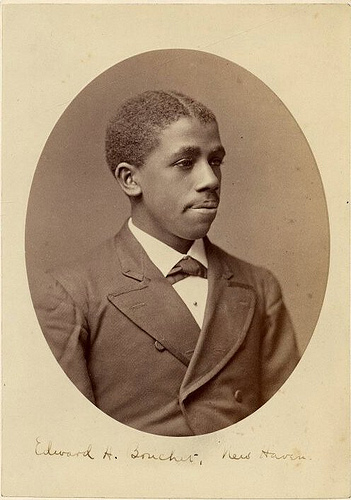by Andy Piascik
When Edward Alexander Bouchet was born on September 15, 1852, in New Haven, there was little likelihood of him one day attending nearby Yale University (known at the time as Yale College). Though there were no policy statements excluding African Americans, and those in charge likely denied the existence of any “unwritten” policy to that effect, no known black student had ever attended Yale. And as with so many American educational institutions of the period, Yale seemed unlikely to change its policy anytime soon.

Portrait of Edward Alexander Bouchet, Yale College class of 1874, the first African-American to graduate from Yale College – Yale University Manuscripts & Archives Digital Images Database
The abolitionist movement challenging white supremacy grew quite powerful by the time Bouchet was born, however, and it dramatically changed the country. Those changes, Bouchet’s thirst for knowledge, the tenacity of his parents, and the commitment of a dedicated teacher all coalesced to open doors for Bouchet.
Edward’s parents, William and Susan Cooley Bouchet, respected figures in New Haven’s African American community, saw firsthand all that Yale had to offer, although they were not students. William was a former slave who worked at Yale as a janitor and was also a deacon at a New Haven church, while Susan washed laundry for Yale students.
In keeping with the segregated norms of the time, Edward began his formal education at the all-black Artisan Street Colored School, which employed only one teacher, Sarah Wilson. Wilson was instrumental in Bouchet’s life as both a teacher and in encouraging him to pursue an education commensurate with his abilities. Bouchet moved on to New Haven High School for two years before transferring to Hopkins, a prestigious private school in New Haven, where he graduated as class valedictorian in 1870. That year, he earned acceptance to Yale.
Yale’s First Black Student?
Beginning in 1870, many sources, including Yale itself, referred to Bouchet as the school’s first African American student. Information unearthed in 2014, however, indicated otherwise. Research by several scholars and writers, including some at Yale, indicated that three men thought to be white and who preceded Bouchet at the school—Moses Simon (Class of 1809), Randall Lee Gibson (Class of 1853), and Richard Henry Green (class of 1857)—at various times appear in public records as Negro, black, and mulatto.
Whether Bouchet was the first, second, third, or fourth African American to attend Yale, he was a brilliant student. After graduating, he continued at Yale in the newly created PhD program in physics. When he finished his dissertation (“Measuring Refractive Indices”) in 1876 after just two years of graduate study, Bouchet was one of the first six people in the United States to receive a doctorate in physics and the first African American to earn such a degree (in any field) from an American university.
Despite his obvious abilities, when Bouchet looked for employment as a teacher, he received rejections from every university and college to which he applied. So one of the most brilliant physicists in the country found himself relegated to teaching at segregated, all-black high schools. Even then, Bouchet eventually ran up against color barriers. His first job upon leaving Yale was at the Institute for Colored Youth (ICY) in Philadelphia, a school established for blacks by the Society of Friends. He taught there for 26 years until 1902 when the school, in thrall of the work and philosophy of Booker T. Washington (who was at the apex of his influence at the time), did away with ICY’s academic, college-oriented mission and turned the school into an industrial-vocational institution.
Bouchet worked at a number of jobs over the next 14 years, mostly as either a high school administrator or teacher, and moved frequently. He developed serious health problems that forced him to retire in 1916 and he returned to New Haven. He moved into the house at 94 Bradley Street where he had grown up and died there in 1918 at the age of 66.
Bridgeport native Andy Piascik is an award-winning author who has written for many publications and websites over the last four decades. He is also the author of two books.









